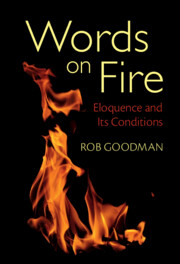Book contents
- Words on Fire
- Words on Fire
- Copyright page
- Dedication
- Epigraph
- Contents
- Acknowledgments
- Introduction: “Just Words”
- PART I Eloquence and the Ancients
- 1 “I Tremble with My Whole Heart”
- 2 The Parthenon and the Outhouse
- Postscript: Quintilian, Tacitus, and the Problem of Large-Scale Decorum
- PART II Eloquence and the Moderns
- Bibliography
- Index
Postscript: Quintilian, Tacitus, and the Problem of Large-Scale Decorum
from PART I - Eloquence and the Ancients
Published online by Cambridge University Press: 16 December 2021
- Words on Fire
- Words on Fire
- Copyright page
- Dedication
- Epigraph
- Contents
- Acknowledgments
- Introduction: “Just Words”
- PART I Eloquence and the Ancients
- 1 “I Tremble with My Whole Heart”
- 2 The Parthenon and the Outhouse
- Postscript: Quintilian, Tacitus, and the Problem of Large-Scale Decorum
- PART II Eloquence and the Moderns
- Bibliography
- Index
Summary
In the rhetorically circumscribed world that Cicero feared and that Caesar did so much to bring about, Quintilian operated a successful school of rhetoric, tutored the sons of the emperor Domitian, and composed the twelve-volume Institutio oratoria. The Institutio, published circa 95 ce, not only compiled and transmitted much of the Greek and Roman rhetorical tradition; it also raised troubling questions about that tradition’s viability – questions of the kind that will motivate the second part of this book. We might call these problems of decorum on the largest scale: issues not of fit between specific words and a particular rhetorical situation, but between broad norms of speech and large-scale political, institutional, and cultural conditions.
- Type
- Chapter
- Information
- Words on FireEloquence and Its Conditions, pp. 78 - 84Publisher: Cambridge University PressPrint publication year: 2021

